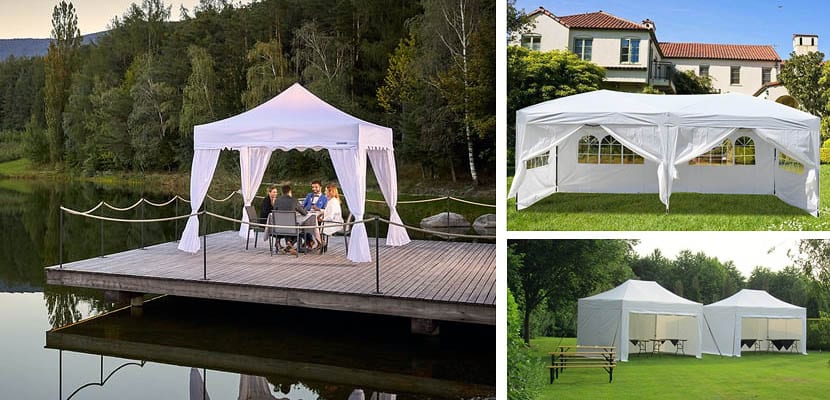
All the folding tents they are very versatile and are used in many situations. You may have seen them at book fairs, farmers markets, and trade events. In addition, they are increasingly used in private gardens to protect the sun and rain to the guests of a party.
The folding tents adapt to almost any situation. They are quick and easy to assemble; no need for tools or professional help. They are also available in a wide range of sizes, the most common being 3 × 4'5 and 3 × 6 m. Learn about the characteristics, advantages and disadvantages of this type of tents with us.
Characteristics of the folding tents
«Large awning that covers a circus or any other large enclosure» This is one of the meanings of tent in the dictionary of the Royal Spanish Academy of the Language. A very general definition that the folding term qualifies by introducing the portability concept.

A folding tent consists of a structure generally made of aluminum, joining elements and / or screws used to join the pieces of the structure and a large awning. Their quality depends largely on the manufacturing materials of these elements. It is recommended that ...
- Canvas be made of polyester and covered with PVC. It will thus present good properties of resistance to moisture, abrasion, degradation ... as well as a lighter weight.
- The structure be made of anodized aluminum to guarantee a quality structure.
- The joining elements They are made of steel since they have a tensile strength and breaking strength. And that they present a plasticized treatment to prevent unnecessary friction.
- Both screws Like the nuts used to join the steel parts of the structure, they are zinc-plated to protect the steel from oxidation and also have a plastic finish to protect the canvas.

Types of folding tents
When the tent only has the aforementioned elements, we speak of a base tent. However, today many tents have walls in order to provide greater privacy or more effectively protect those inside from inclement weather. In short, we can find different types of tents on the market, depending on whether or not they have walls and what is their distribution or design.
- No walls. It is a tent composed of a structure and a canvas as a roof whose objective is to shade and protect the space it occupies from the rain.
- With opaque walls. Tents with opaque walls, in addition to greater protection against inclement weather, provide greater privacy. They are the most suitable if we do not want the interior to be seen from the outside. Walls can generally be collected, a great advantage in adapting to changing circumstances.
- With windows. Tents with windows allow not only the vision between the interior and the exterior, but also the passage of light.

Advantages and disadvantages
Are the folding tents the most suitable in all situations and under any circumstance? Definitely not. Folding tents have many advantages, but we must not forget that like any light and portable structure, it also has its disadvantages.
Advantages
- Easy assembly: In most cases, no mounting tools or professional help is required to mount them
- quick installation: If you have the help of another person, it will take 5 minutes to assemble it.
- Easy transportation: Once collected, the folding tents take up very little space, which together with their lightness greatly facilitates their transport.
- Waterproof: The canvases made of PVC-coated polyester are totally resistant to water. A very useful feature when the weather is not good.
- Customizable: Canvas is a material that can be easily customized. In addition to finding it in numerous colors, it allows the printing of logos or signatures.
- They do not require permits: Its assembly does not require official permits.

Disadvantages
- Limited size: The folding tents come in various sizes. The largest ones measure 3 × 6 m. which may be insufficient if you want to organize an event with a lot of people.
- Wind resistance: You have to secure the tent very well both to the ground and to a fixed point if we want it to withstand strong winds. Still it can be dangerous.
- Performance and durability: Folding tents generally offer less resistance than fixed tents. Being tents that are frequently assembled and disassembled, in addition, they are more exposed to the wear of the joining elements.
Now that you know the characteristics, advantages and disadvantages of folding tents, it will be easier for you to know if they are the most suitable for the use you want to give them. And if so, you will know what you should keep in mind when buying one, regardless of its price.
If you like to prepare garden parties During the summer, folding tents can be a good alternative to protect your guests from the sun while they eat, don't you think?